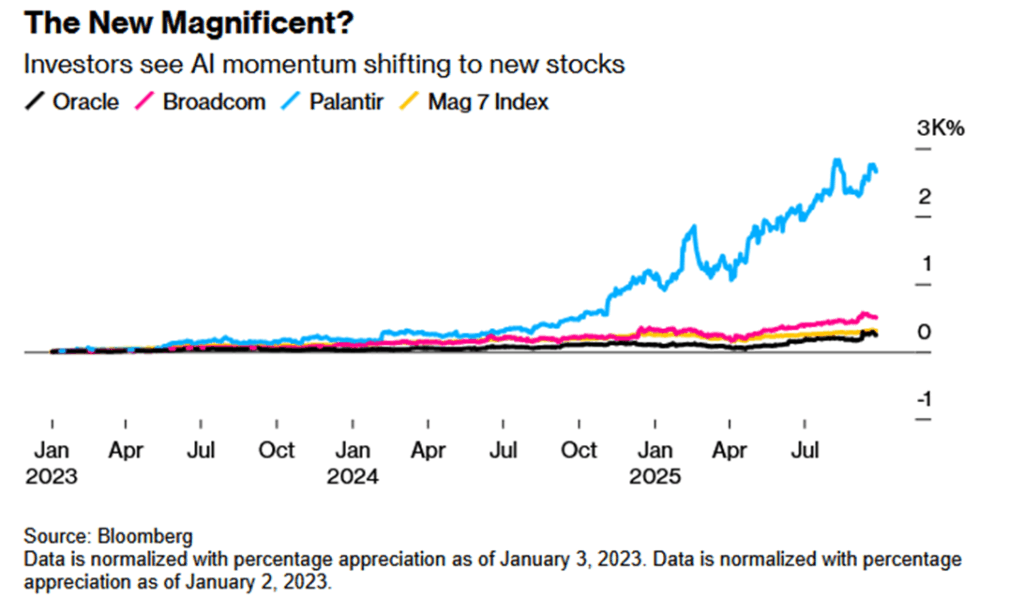1. The New Mag …ORCL, PLTR, AVGO

Bloomberg
2. Bull Rush into Call Options

3. ”Circularity” The New Buzz Word in Tech

Prof G Markets
4. Softbank +125% 2025 on AI Bets…..After 2+ Years of Sideways Action

StockCharts
5. Biotech Gets in Green for Year on Small Cap Rally….Rolls Over at 2024 Highs

StockCharts
6. Intel Gets Back to 1999 Levels

Bespoke
7. The Taliban Has Shut Off the Internet in Afghanistan

Spencer Hakimian
8. America’s Immigrant Population

Voronoi
9. Updated Mortgage Rates Across the Spectrum

MortgageCS
10. The Body’s Hidden Role in Mental Illness: What 100 Years of Psychiatry Missed
Twenty years ago, I wrote The UltraMind Solution proposing a radical idea: to fix your broken brain, you need to fix your body first. The medical establishment wasn’t ready. Today, Stanford Medicine is proving me right.
Dr. Shebani Sethi just published results that should shake psychiatry to its core. Her metabolic psychiatry approach achieved what decades of psychiatric drugs couldn’t: 100% reversal of metabolic syndrome in patients with serious mental illness, plus dramatic improvements in their psychiatric symptoms.
Here’s the science they don’t want you to know.
The 100-Year Cover-Up
A century ago, psychiatrists observed elevated lactate and low glutathione in patients with serious mental illness—clear markers of cellular energy dysfunction. Then we abandoned this research for the more profitable neurotransmitter model.
This resulted in treating symptoms while ignoring causes.
Your Brain on Metabolic Dysfunction
Consider these facts:
- Type 2 diabetics’ mitochondria function at half the rate of healthy individuals
- The brain has the highest concentration of mitochondria of any organ
- 93.2% of Americans have some form of metabolic dysfunction
- People with insulin resistance have double the risk of depression
When your cellular powerhouses can’t produce energy efficiently, your brain doesn’t get a headache—it produces depression, anxiety, bipolar disorder, and schizophrenia.
The Stanford Breakthrough
Dr. Sethi’s ketogenic therapy trial delivered results that would make Big Pharma nervous:
- 36% reduction in visceral fat
- 27% reduction in insulin resistance
- 12% weight loss
- Complete reversal of metabolic syndrome in every participant
- Significant improvement in psychiatric symptoms
Unlike psychiatric medications that cause weight gain, diabetes, and metabolic syndrome, this approach fixes the underlying biology.
The Mechanism Medicine Ignores
Here’s what happens when your metabolism breaks down:
- Mitochondrial dysfunction reduces brain energy
- Chronic inflammation damages neural pathways
- Insulin resistance impairs neuroplasticity
- Oxidative stress accelerates brain aging
We’ve been giving antidepressants to people with broken cellular metabolism. It’s like trying to start a car with sugar in the gas tank.
Beyond the Ketogenic Diet
Metabolic psychiatry isn’t just about going keto. It’s about fixing the four core mechanisms of metabolic disease:
- Mitochondrial dysfunction
- Chronic inflammation
- Oxidative stress
- Impaired cellular plasticity
This means testing and optimizing:
- Insulin resistance markers (triglyceride/HDL ratio)
- Inflammatory markers (CRP, cytokines)
- Nutrient deficiencies (B vitamins, omega-3s, vitamin D)
- Mitochondrial function
- Gut health and microbiome
The Uncomfortable Truth
At our Function Health centers, we’re seeing what Dr. Sethi describes: 70% of people have nutritional deficiencies, 95% show metabolic dysfunction, and 46% have elevated inflammation markers.
We’re not dealing with a mental health crisis, we’re dealing with a metabolic health crisis that manifests as mental illness.
What This Means for You
If you’re struggling with depression, anxiety, or other mental health issues, ask yourself: Has anyone ever checked your insulin resistance? Your nutrient levels? Your inflammatory markers?
Probably not. Because the current system profits from managing symptoms, not curing diseases.
Dr. Sethi has launched Metabolic Psychiatry Labs to make this approach accessible nationwide. Stanford is scaling up research. The science is solid.
The question isn’t whether metabolic psychiatry works—it’s whether our healthcare system will embrace it or continue pushing pills that treat symptoms while the underlying biology deteriorates.
Your brain deserves better than a broken system. Your body holds the keys to your mental health.
Listen to our full conversation here: https://youtu.be/mVPhltup0IY?si=oP0RumBgN0R6_DV9